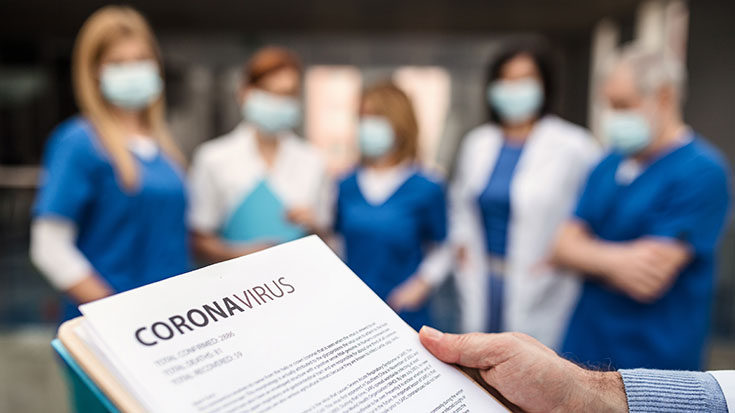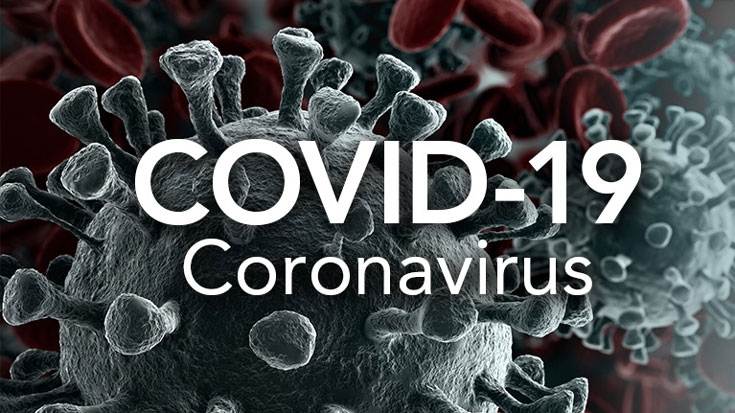
Kathy Rye, EdD, RRT, FAARC, has spent the last 35 years as an RT and an RT educator, working at facilities in the Shreveport/Bossier, LA, area and serving on the faculty at the University of Arkansas for Medical Sciences (UAMS).
She officially retired in 2012 but continued to teach part-time and assist her professional organizations, most recently as a member of the AARC’s APRT, Credentialing and Education Committee and the CoARC board of commissioners.
As such, she’s played a significant role in advancing the profession. Last March she found herself on the receiving end of all those efforts when she fell victim to the COVID-19 pandemic.
It started with a cough
Rye developed symptoms after flying from New Orleans to Nashville to teach a review seminar for 30 RT students getting ready to sit for the RRT exam and then on to Dallas for a meeting.
She first noticed a dry hacking cough during that meeting, and initially thought her generally well-controlled asthma was flaring up. Not long after she got home, however, her fever spiked to 102 and she decided to go to urgent care, where a nasal swab confirmed she had COVID-19.
Five days later she was admitted to Our Lady of the Lake Regional Medical Center in Baton Rouge. Two days after that she was intubated. She went on to spend 45 days on a ventilator and 60 days in the hospital.
At one point her clinicians saw such little hope for recovery that they began advising her family to plan for end of life care. Her family had a hard time getting on board with that, though, and their hesitance paid off.
A couple of days later she woke up and proceeded to make steady progress toward recovery. She was discharged from the hospital, and by July 8 was well enough to share her COVID-19 journey with a reporter from the WWL-TV station out of New Orleans. You can watch that video here.
Our questions, answered
We asked Dr. Rye to tell us more about her experiences with COVID-19 and, most especially, the care she received from her fellow RTs. Here are her answers to our questions —
As a 35-year veteran of the profession, you obviously knew what was happening during your care in the ICU. How did it feel to be on the other side of patient care?
It was absolutely terrifying! When the physician came in and told me I had to be intubated, I tried bargaining with him to try other therapies. When he made it clear to me there were no other options, I agreed, as I knew I wanted every opportunity to come out of this alive. On the third day of mechanical ventilation, proning was initiated, which did improve hypoxemia. Twenty-eight days after intubation, a tracheostomy was performed. Because I was sedated and paralyzed, I have no memories until 30 days later.
RTs were integral to your care, both while you were on the ventilator and during the liberation process. What would you like to say to these therapists (and by extension, all the other RTs out there on the front lines of COVID-19) about the value of the care they provided?
I want them to know they are all my heroes. Thank you for using your tremendous skills to care and advocate for me during the time I had no voice. Thank you as you courageously stood on the front line, perhaps risking your own and your family’s lives. Without your excellent care, I would not be here to tell my story.
After 45 days on the ventlator and 60 days in the hospital you are no doubt now an expert on what patients need from their RTs and other care providers. Do you have any tips you can share with your fellow AARC members about caring for patients during the COVID-19 crisis?
- Take care of yourselves, mentally and physically! I can’t even imagine the exhaustion you must feel with the long hours you have been putting in and with seemingly no end in sight.
- Continue to research and use best practices. There is still so much we don’t know about this monster virus. Recognize that the skin of the COVID patient becomes very fragile. Pulling the endotracheal tube holder adhesive off my face left a big hole in my cheek, which resulted in a scar.
- Continue to advocate for your patients. Be their voice! Advocate for patients to be trached as soon as possible. It was 28 days before I was trached. Suggest that intubated patients be retested for COVID-19. It the repeat test is negative, they can be taken safely to the OR for a tracheostomy.
- Communicate with your patients. You have certain things that have to be done when you go into that room, but take a minute to look your patient in the eyes and find out what they need. Waking up with a trach in place, it was so hard to communicate with my caregivers. Family could not be there. Thankfully, an extended family member was an employee at the facility and she was able to come in and help me understand what was going on, answer my questions, and be my advocate.
- Pay attention to the positioning of your patients, especially if they are being proned. I sustained permanent ulnar nerve damage at the elbow as a result of positioning and have a “claw hand” on my dominant hand as a result.
The video is dated July 8. At that time, you looked great! How are you doing now, and what will your long-term recovery entail? How do you think RTs might be involved on a continuing basis?
I am now about two months out since discharge from the hospital. My pulmonary function was done at one month out, and thankfully I am on the low side of normal. I do have slight vocal cord damage from being intubated for 28 days.
I did PT and OT three days per week after discharge from the hospital. The PT told me that it would take 3-6 months to get back, but I was actually discharged from PT at two months. I will be continuing OT for my right hand for some time.
There are certainly patients out there that have had more permanent damage to their lungs and will need pulmonary rehabilitation. I know our RTs will rise to that challenge.
How does it feel to have survived such a severe bout of COVID-19? What does the future hold for Kathy Rye?
I know that I have been blessed and am humbled by this life experience. It has been especially touching to hear from numerous colleagues from across the country and from former students during and after my illness. Being a survivor has sparked a fire that I will definitely carry with me for the rest of my days. I am beyond thankful for the front-line RTs who have sacrificed so much to give their patients hope. I am so grateful to my health care team at Our Lady of the Lake and Sage LTAC in Baton Rouge, who always exhibited professionalism and a caring attitude.
I am open and ready to consider opportunities that may come. I believe this experience has shown me that I now have an opportunity to reinvent myself at the young age of 65. Failure and giving up is never an option for me. I retired from UAMS eight years ago to be able to spend more time with family, and that is still a top priority. I am sure I will be heavily involved with the homeschooling of my granddaughters in the months to come, if necessary. I will also be continuing my service to the CoARC for at least the next three years. I have had a discussion with the program director of an area RC program and may be able to train as a standardized patient for allied health students. As for what else is next for me, stay tuned.
Keep the Conversation Going
Email newsroom@aarc.org with questions or comments, we’d love to hear from you.

















